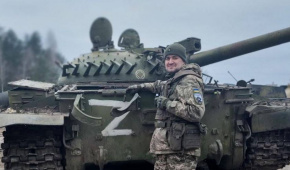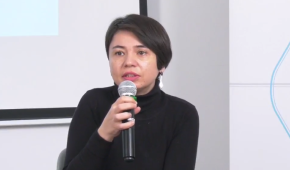Teenager from Mariupol releases a documentary based on a video journal he kept under occupation
Vladyslav Pyatin-Ponomarenko, a Mariupol resident aged 17, released a documentary based on the video journal he kept under occupation. Vladyslav spent 75 days in the occupied city, losing his home.
He told Hromadske Radio about this.
Vladyslav recalls: on the morning of February 24, the lines in grocery stores were already crazy, the lights went out and mobile connection was poor. At first his family would go to the hospital where his grandmother was lying with COVID-19 and on a ventilator to charge batteries and phones.
The boy started his video journal on February 26, 2023, having discussed the camera work with his father.
"We discussed it with my father and decided that it must be filmed, because these are gross war crimes, this is hell, and we thought that no one would see it, because we were informationally isolated, so we thought that if no information was getting through from the outside, then none must have been getting out, either," Vladyslav said.
They filmed everything on his father's old camera for beginners, charging it with a small solar battery as best they could.
"We mostle filmed everything with a camera, but when it ran out of battery and we couldn't recharge it anymore, I even used my laptop, which had a little battery left at that time. I managed to film with the laptop's webcam. All these shots are very exclusive, difficult and valuable, because everything was running out of power, it was very dangerous to come close to the windows because of possible shrapnel, snipers or just missile strikes, so I think that these 20 minutes that we were able to shoot are gold", adds the boy.
On March 7, the filming became even more difficult. A shell hit Vladyslav's house, so the family had to move to the basement and was going outside much less often.
“I have footage of myself in the basement or cooking on the fire at the porch. We had a tiny brazier, and we cooked food on it, well, if you can call that food – it was always some kind of soup or flatbread," the boy said.
He managed to record not only the scope of destruction, but also the behavior of the occupiers. However, there are moments that could not be captured on fim and remained in his memory only.
"I filmed the so called 'humanitarian aid', when they first forced people to unload everything and then gave them some food. Unfortunately, I could not film Chechens throwing food stolen from Ukrainian warehouses at people and shouting 'Here, khokhol dogs guzzling.' Also, the documentary does not include a shot of those same Chechens behaving very demonstratively, with a cameraman walking in front filming them as they walk behind him and just shoot at random houses, although there was no one there anymore, the territory had been cleared, according to them," says Vladyslav.
When Internet and mobile signal first started to appear in April, Vladyslav immediately started posting everything on his Instagram despite the risk.
The boy lived on the left bank of Virgin Mary's city, therefore there was only one way to evacuate – through Russia, because the Russians completely shut off the usual route to the government controlled part of Ukraine. In any case, they had to pass many checkpoints and thorough searches, and such baggage of files could pose a problem. If you don't delete it yourself, the soldiers at the checkpoint could do it for you.
"I carried these shots out literally in my underwear. From the first day of my stay in Mariupol amid the full-scale invasion to the last, we had no power supply. Eventually, generators came along and I was able to transfer my files. It was very difficult and slow, and people could see you are uploadig something from the camera to the laptop and get suspicious of you. Being very afraid, I somehow copied the files, then threw a pack of laundry into the bad, and they did not find it there. But I was forced to delete a lot of footage that was on my phone, taken during the occupation," Vladyslav said.
The footage inspired Vladyslav to create his own documentary. The guy released the first version of this short film on October 14 for the Day of Ukraine's Defenders. He says that it was "raw" in terms of content and much shorter. Subsequently, he was sent footage from Mariupol which supplemented his own film. When Vladyslav learned that there was an opportunity to present his work at the War Diaries exhibition in Amsterdam, he started refining the film.
The boy is satisfied with the first feedback he got from the audience:
"I got good feedback, because before the premiere in Amsterdam, I didn't really promote the film in any way, thinking that it was too short, that I didn't put much into it, that there were a lot of directorial mistakes. But now I am grateful to the people who watched and supported me. That's how I realized the value of my product and that it's not just a film about war, but really something I put my soul into, which the audience can also see, and they do see it and take on that energy."
Help us be even more cool!


